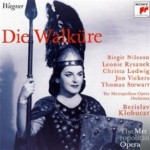The run of Walküres at the Met in late 1967 and early 1968 were to be directed and conducted by Herbert von Karajan–and indeed, the Austrian maestro helmed the November and December performances to great and very controversial acclaim. Critics found his “chamber” approach to the opera both brilliant and incorrect, depending on whom you asked, but almost nobody enjoyed the staging, which gave the characters very little to do. In addition, the lighting was so dim that you could barely see the principals, a point driven home by the fact that Birgit Nilsson showed up at a rehearsal wearing a miner’s helmet, bringing the discussion home with great sarcasm. Back to Europe Karajan went, and unfortunately came down with influenza and could not travel, which led to the substitution for the February performances of Berislav Klobucar as conductor. As you can tell from this broadcast of February 24, 1968, Klobucar, leading an absolutely dream cast, left nobody feeling deprived.
Because all of the principals are well known, I won’t elaborate too much; suffice it to say that all are in their primes. Jon Vickers’ vocal production never has sounded freer and more secure; there isn’t anything the gigantic voice cannot and does not do. His Siegmund is suspicious, confused, manly, loving, tender, resolved–and at all volume levels. He is matched by Leonie Rysanek’s Sieglinde. Always an earthy, involved singer, her tendency to sing sharp is almost never in evidence, and the voice is all of a piece, without the three or four “empty” notes in mid-voice that often plagued her. We are riveted by her storytelling (and the obvious attention she’s paying to Siegmund) in Act 1, and her last-act “O hehrestes Wunder!” is superbly cathartic. Karl Ridderbusch’s Hunding varies between utterly menacing and somewhat dull. The Valkyries are properly noisy and very accurate.
God-wise, we’re on equally firm ground. By 1968 Nilsson was without peer as Brünnhilde, the voice gigantic–listen to the long swoops up to the Bs and Cs in her opening Battle Cry, and marvel at the sheer strength and accuracy of the voice from top to bottom–and she is regal and loving throughout. Her Announcement of Death is potent and godly, her disobedience thoroughly understandable. And her last act is stunning as well.
Thomas Stewart was a favorite of Karajan’s, and it’s easy to see why. He’s the most human and vulnerable of Wotans, the voice just a bit small for the part–but in the reading of the text his sensitivity and intelligence are on an epic level. Together, he and Nilsson can move us to tears in Act 3. And Christa Ludwig as Fricka would be a tough one to say “no” to.
Klobucar’s reading lacks the sweetness and transparency in Act 1 that Karajan engendered everywhere, but his reading is thrilling, sensible, and a fine piece of musical narrative. The Met Orchestra, trained by Karajan but obviously doing Klobucar’s bidding, plays beautifully (apart from a few horn bobbles) and tempos are never eccentric. This is a great performance. Is it the best? Well, it’s among the best to be sure, but maybe Keilberth 1955 on Testament is “deeper” (whatever that means). This one is in bright stereo, by the way.
































